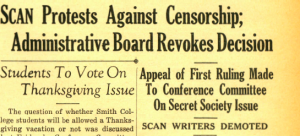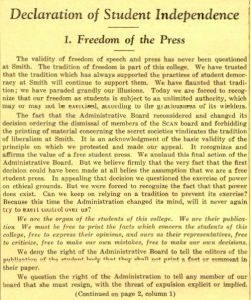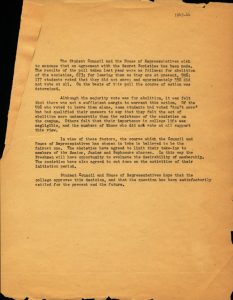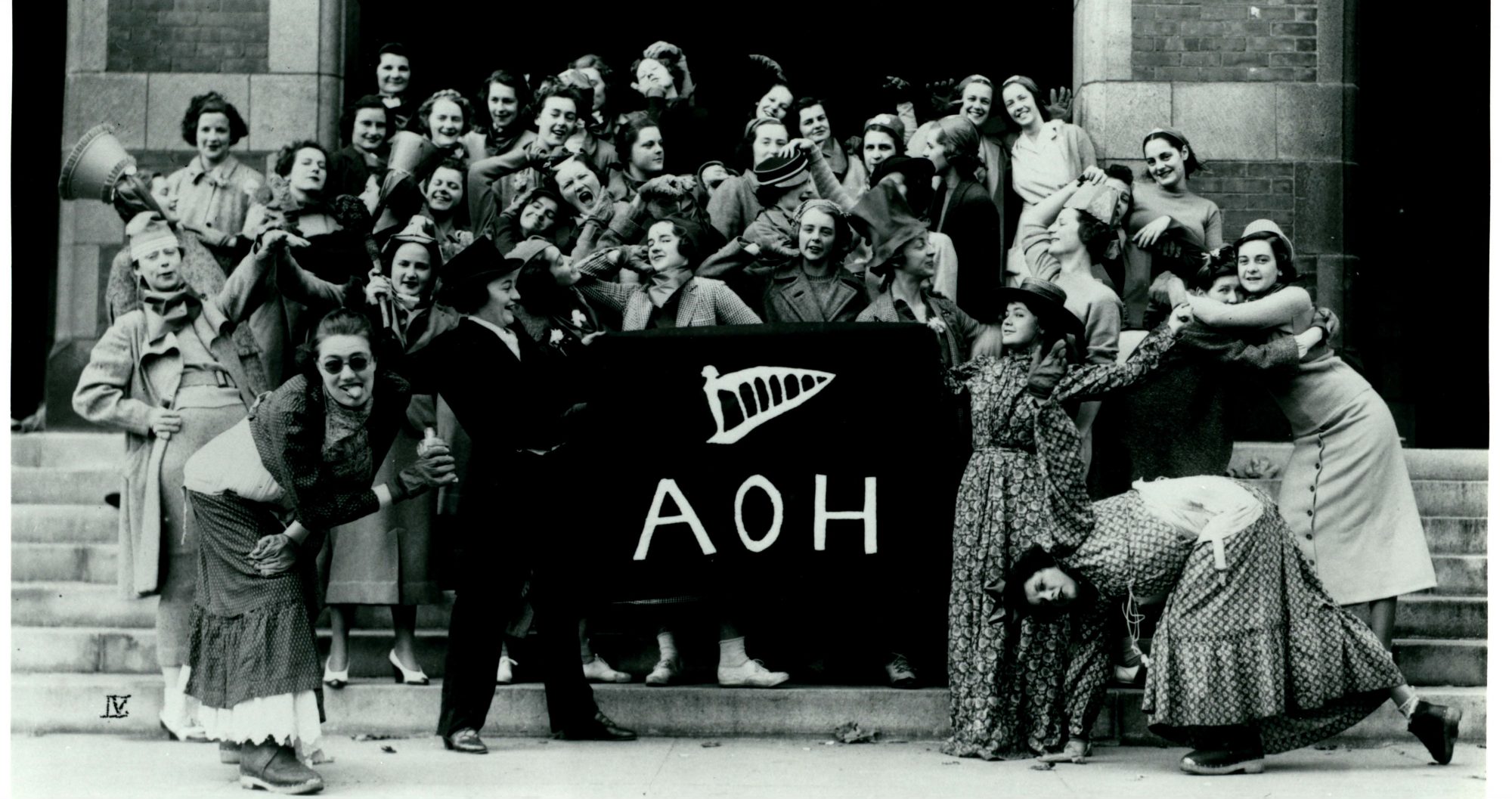Smith College Weekly Speaks Out
Much of the conflict with secret societies can be traced through the student newspaper at Smith. On April 10, 1940, the Smith College Weekly published the editorial, “Are Secret Societies Necessary?” They called for the abolition of secret societies at Smith College because they believed they are “fragrantly undemocratic.”1 In response, the paper ran, “Societies Don’t Worry Dean But Mrs. Scales Is Silent,” Smith College Weekly asked Dean Nicolson for a statement and she responded that the societies were negligent in her life at Smith. She also told the paper that if the societies became larger, they could be a threat to democracy at Smith College. 2 An editorial on April 24, 1940, “The Secret Societies Issue,” credited the April 17, 1940 editorial with causing the A.O.H. and Orangemen to cut down on their activities and presence by not having public activities, being in the yearbook, or wearing their paraphernalia anymore. The Weekly made their stance clear,
“We do not wish to condemn unofficial clubs or societies, organized by a group of friends for their own enjoyment. It is only when these groups become recognized by the college as secret, undemocratic parts of the extra-curricular system that we are opposed to them. Therefore, since they have decided to do away with demonstrations and public rites, they will no longer be recognizable as sanctioned college functions and will, in that respect cease to exist.” 3
Students continued to make their voices and opinions heard on the matter through letters to the editor in Smith College Weekly, some students supported the efforts of Weekly and others found the paper to be overreacting about secret societies.4
Secrecy and Journalism Clash
It is apparent that the student paper (which at this point was called Smith College Associated News or SCAN for short) kept up their fight against secret societies. On December 5, 1941, scandal and claims of censorship hit. SCAN published, “SCAN Protest Against Censorship; Administrative Board Revokes Decision” detailing their recent brushes with punishments fro administration. 5

The incident at the center of this issue occurred on November 15, 1941 when two members of the SCAN board broke into the Orangemen president’s room in Sessions house to steal documents to copy and use against secret societies. According to SCAN, this was not sanctioned by the board. The editorial board was working on a campaign against secret societies that fall. 6
The two unnamed members of SCAN found a locked chest in the Orangemen president’s room and lowered it out a window of Sessions House. Once they opened it and copied documents, they went to return the chest with the original documents. At this point, they were caught by the Head of House who reported them to the Warden of the college (Dean of Students), Laura Scales. 7
Punishment and Free Speech
At first, one of the punishment’s was that SCAN could not write about secret societies for the rest of the school year because the administration believed they would not be able to distinguish between the stolen information and that procured through normal means. But, SCAN appealed this decision. The revised punishment devised that in order for SCAN to publish about secret societies, they needed to get approval from the Head of the Orangemen, President of Student Government, and from the editor-in-chief of SCAN that none of the information was gained through the theft. 8
Still, SCAN published in this same issue their “Declaration of Student Independence,” because they believed the original punishments’ existence “belies the assumption that we are a free student press.”9 This incidence is further evidence of the administration’s awareness of secret societies on campus, as they intervened and seemingly protected the societies from being exposed in ways that were unfair.

Student Opinions Collected
Early in the fall of 1943, SCAN publicized the results of a poll on secret societies done during the 1942-1943 school year. 10 The poll was about the abolition of secret societies with the options: abolition of secret societies, no change, and an option for students with no opinion on the matter.
1,446 students voted. 550 students did not vote.
673 students wanted the abolition of secret societies.
596 students wanted no change around secret societies.
And, 177 students “did not care.”11
This meant that 773 students were not for ending secret societies. So, “although the majority vote was for abolition, it was felt that there was not a sufficient margin to warrant this action.” Some of the students who voted “don’t care” also added reasons why they felt that way, such as outlawing secret societies being “more undemocratic than the existence of the societies on the campus.”12
Changing the Secret Societies
So, instead of abolishing secret societies, Student Council and the House of Representatives came to an agreement with the groups: only sophomores, juniors and seniors would be in the groups and the societies would dial down their initiation events. The hope was that “Freshmen will have the opportunity to evaluate the desirability of membership.”13 When the article was published, the two administrative bodies were still waiting on approval from the College.

The End of Secret Societies?
According to the Smith College Special Collections, secret societies were ended at Smith in 1948 by President Davis who believed that they were undemocratic.14 However, the A.O.H., at least, continued until 1966.15
Footnotes
- “Are Secret Societies Necessary?” Smith College Weekly, April 10, 1940, 2, General, 1949-1959, undated, Ancient Order of Hibernians Records, Box #3011.1, Smith College Archives, CA-MS-00023, Smith College Special Collections, Northampton, Massachusetts. ↩
- “Societies Don’t Worry Dean But Mrs. Scales Is Silent,” Smith College Weekly, April 17, 1940, 1, 7, General, 1949-1959, undated, Ancient Order of Hibernians Records, Box #3011.1, Smith College Archives, CA-MS-00023, Smith College Special Collections, Northampton, Massachusetts. ↩
- “The Secret Societies Issue,” Smith College Weekly, April 24, 1940, 2, General, 1949-1959, undated, Ancient Order of Hibernians Records, Box #3011.1, Smith College Archives, CA-MS-00023, Smith College Special Collections, Northampton, Massachusetts. ↩
- Smith College Weekly, May 1, 1940, General, 1949-1959, undated, Ancient Order of Hibernians Records, Box #3011.1, Smith College Archives, CA-MS-00023, Smith College Special Collections, Northampton, Massachusetts. Examples: “Commends ‘Weekly,'” “She’ll Bite” by Methuselah, “‘Weekly’ Says ‘Thanks.'” ↩
- “SCAN Protests Against Censorship; Administrative Board Revokes Decision,” Smith College Associated News, December 5, 1941, Volume 37, No. 20, Student publications and student publications records, Smith College Archives, CA-MS-00013, Smith College Special Collections, Northampton, Massachusetts. ↩
- “SCAN Protests Against Censorship,” PAGE NUMBER. ↩
- “SCAN Protests Against Censorship;” “Collection: Laura Woolsey Lord Scales Papers,” Smith College Finding Aids, accessed April 28, 2022, https://findingaids.smith.edu/repositories/4/resources/392. ↩
- “SCAN Protests Against Censorship,” 3, 6 ↩
- “Declaration of Student Independence,” Smith College Associated News, December 5, 1941, 1, Volume 37, No. 20, Student publications and student publications records, Smith College Archives, CA-MS-00013, Smith College Special Collections, Northampton, Massachusetts. ↩
- “Secret Societies to Continue; to Take Only Upperclassmen,” Smith College Associated News, September 24, 1943, Student publications and student publications records, Smith College Archives, CA-MS-01049, Smith College Special Collections, Northampton, Massachusetts. ↩
- “Secret Societies to Continue,” 1 ↩
- “Secret Societies to Continue,” 1 ↩
- “Secret Societies to Continue,” 3. ↩
- “Collection: Ancient Order of Hibernians Records,” Smith College Finding Aids, accessed March 3, 2022, https://findingaids.smith.edu/repositories/4/resources/145. ↩
- Scrapbook, 1938-1966, Ancient Order of Hibernians Records, Box #3011.1, Smith College Archives, CA-MS-00023, Smith College Special Collections, Northampton, Massachusetts. ↩
